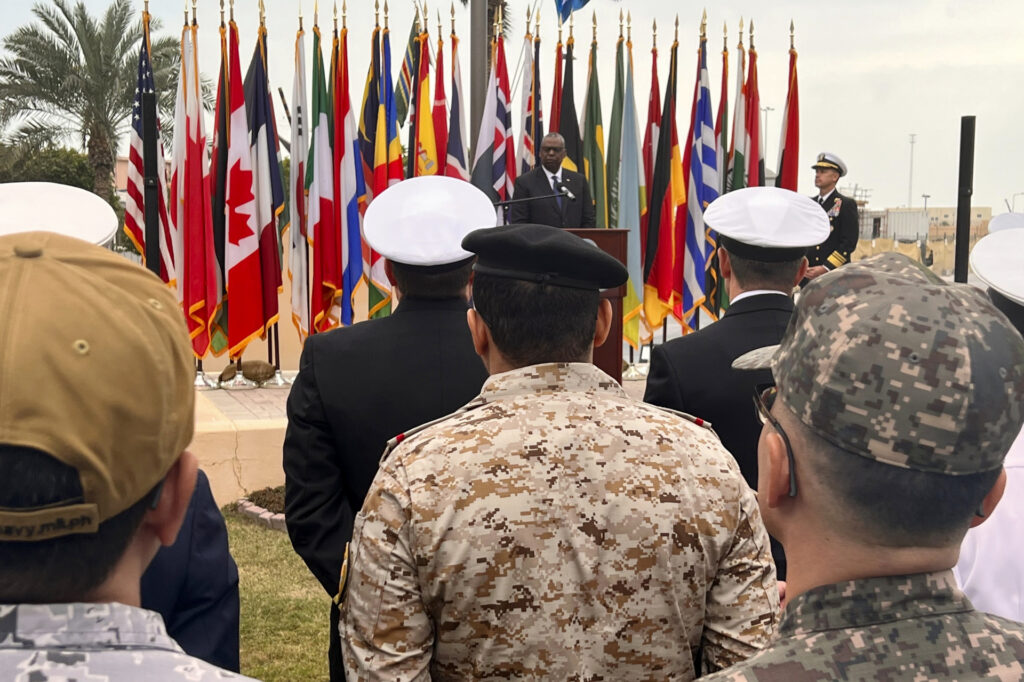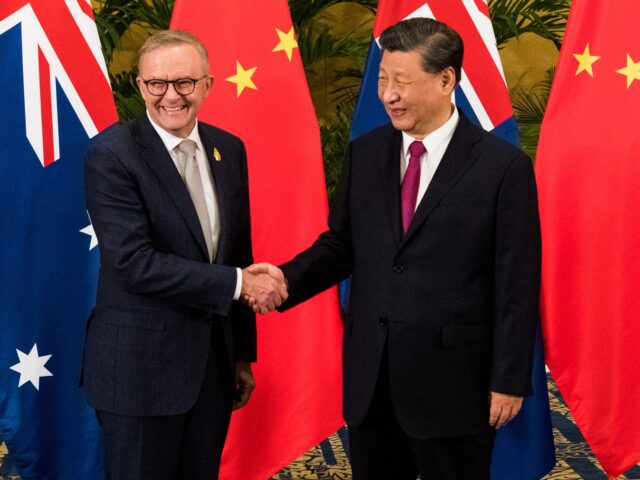The Chinese government was quick to cheer Australia’s rejection of a United States’ call to send a warship to help police vital Red Sea trade routes, gushing Wednesday that Canberra was finally stepping out of America’s “shadow.”
In an opinion piece published by China’s tame state-run media – the Global Times newspaper – author Jerry Grey celebrated the left-wing Labor government of Prime Minister Anthony Albanese reported refusal to send a warship to the Middle East, and Australia’s recent U.N. vote for a ceasefire in contrast to that of the U.S..
He said the moves proved Australia was “distancing itself from the US.”
“(Australia) has finally stepped out of the US’ shadow to call for a ceasefire and could potentially act as a mediator in the conflict if needed. That opportunity will be lost if it has a military presence in the region. It is sensible for Australia to continue distancing itself from the US,” the paper said.
The article, titled “Sensible for Australia to refuse US Red Sea Warship” came with a cartoon of a kangaroo standing at the edge of a hole with a U.S.-branded shovel nearby.
#Opinion: Australia is located on the other side of the world. It has finally stepped out of the US’ shadow to call for a ceasefire and could potentially act as a mediator in the conflict if needed. That opportunity will be lost if it has a military presence in the region. It is… pic.twitter.com/yFru5FVCA0
— Global Times (@globaltimesnews) December 19, 2023
As Breitbart News reported, the Albanese government had been dithering for the better part of a week over whether or not to answer the call from one of its oldest and most steadfast allies.
The direct U.S. request was for Australia to join the expanding multi-national naval force patrolling the Red Sea to keep one of the world’s major trade arteries open.
The Iran-aligned Yemeni Shiite jihadist terror organization, known more commonly as the Houthis, has vowed to block ships heading to Israel until the offensive on the Gaza Strip is ended and has been repeatedly firing missiles at merchant ships in the area.
The international response has been to send warships to counter the attacks, with the U.S., UK, Israel, and France leading the coalition forming the Combined Maritime Forces ready to fight back.
Missile Strikes Norwegian-Flagged Tanker in Red Sea off Yemen in Apparent Expansion of Terror Attackshttps://t.co/fY9ioEOq7y
— Breitbart London (@BreitbartLondon) December 12, 2023
Other participants in the effort include Bahrain, Canada, Italy, the Netherlands, Norway, Seychelles and Spain.
Not so Australia which seems to lack the political will to answer a call from its key ally in Washington, with Albanese slammed as “weak” by critics.
The failure to send a warship was also condemned by Greg Sheridan, foreign editor at the the Australian, who described it as akin to “spitting in the face of our allies”.
“It’s a shocking decision, at every level” he said.

U.S. Defense Secretary Lloyd Austin, rear, addresses members of an international maritime task force protecting commercial ships in the Red Sea at U.S. Navy Central Command headquarters in Manama, Bahrain, Tuesday, Dec. 19, 2023. Due to a sharp increase in attacks on commercial vessels transiting there in the last few weeks the U.S. has announced a new mission, Operation Prosperity Guardian, to get additional countries to send ships and intelligence support. (AP Photo/Tara Copp)
“It’s a spit in the eye to the Americans, just as we are begging the Americans to station 10 percent of their nuclear submarine fleet in Australia to guard our security.
“It’s a spit in the eye at the Brits, just as we’re asking the Brits to send a nuclear powered submarine all the way from Britain to Australia to defend Australia.”
Australia’s conservative opposition has also turned on the government, saying dithering and inaction in Canberra has made Australia a less reliable partner.
In a joint statement the shadow treasurer and shadow foreign affairs and defence ministers said Albanese needed to explain why Australia would not support an international effort to secure the trade route.
“Failing to contribute to securing this trade route means Australians will pay the price for the prime minister’s lack of leadership, with over 12 percent of the world’s trade coming through the Suez Canal,” the opposition frontbenchers said.
“This route requires twice the amount of fuel, adding tens of millions in extra costs to the operators, having a flow-on effect to cargo owners and inevitably consumers, causing further supply chain shocks.”
While Albanese rejects sending a single warship from Australia’s naval fleet, his government is prepared to “examine” the prospect of sending “further personnel” to Red Sea onshore staff.

COMMENTS
Please let us know if you're having issues with commenting.